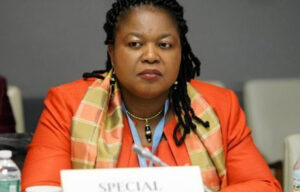Outrage and a renewed sense of urgency are gripping Nigeria following a disturbing video showing young girls, primarily from Imo state, trafficked for forced prostitution in neighboring Ghana.

Professor Joy Ezeilo, a leading voice against human trafficking, spoke out in a powerful statement. Ezeilo, a former United Nations Special Rapporteur on Trafficking in Persons, called on the government at all levels to take immediate action.
“This video is a sickening reminder of the ongoing nightmare of human trafficking in Nigeria,” she said. Her voice trembled with emotion, “These young girls, their dreams stolen, forced into a life of exploitation – it’s heartbreaking.“
Ezeilo isn’t just another concerned voice. During her tenure with the UN, she encountered Nigerians trapped in trafficking or living as undocumented migrants in nearly 100 countries. “Nigeria is not alone in this fight,” she emphasized, “but it is one of the most affected countries in the world.“
The root causes, Ezeilo argues, are complex and deeply concerning. Poverty, lack of education, and a rise in gender-based violence are creating a breeding ground for traffickers.
“The current economic situation is fueling this crisis,” she warned. “Desperate families become easy targets, and young girls are especially vulnerable.“
Ezeilo proposed a two-pronged approach. First, she urged the government to establish early warning systems to identify girls at risk. “We need to track school enrollment, intervene when girls disappear, and ensure they have safe housing,” she explained.
Secondly, tackling the root causes is essential. “We need to address poverty, improve access to education, and create safe working environments for women and children.“
The fight against trafficking is a collective effort. “We need strong partnerships between the government, NGOs like WACOL (Ezeilo’s organization), and law enforcement,” she said. “Together, we can end this barbaric practice and protect our most vulnerable citizens.“
Ezeilo’s call to action is to dismantle the networks of traffickers, empower communities, and give hope back to a generation of girls on the brink.
Victoria Ibiama




